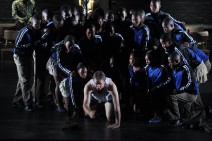
Financial Times, March 26, 2012
The Fairy Queen, UJ Theatre, Kingsway Campus, Johannesburg
By Brent Meersman
Umculo Cape Festival´s production of Purcell´s opera is socially engaged and artistically invigorating
In a country where the performing arts is perforce obsessed with “outreach”, “audience transformation” and “development”, this year´s Umculo Cape Festival production of Henry Purcell´s semi-opera The Fairy Queen breaks ground on several fronts even as it raises eyebrows.
Besides the obvious – recruiting the chorus from schools in South Africa´s townships and running workshops that emulate Venezuela´s world –renowned El Sistema – Umculo, brainchild of FT critic Shirley Apthorp, has chosen baroque opera. The form is largely unfamiliar to local audiences besotted with the romantic repertoire, yet it is ideally suited to young voices and the country´s strong choral traditions.
But it is the provocative approach of German opera director Robert Lehmeier that opera as a positive social agency aquires force. Purcell´s libretto is based on Shakespeare´s A Midsummer Night´s Dream with all its amour fou, and Lehmeier has taken full advantage of this licence. This is not cute school choir for do-gooders to sentimentalise over. The production makes a solid break with a European habit of infantilizing Africans. These are serious young adults exploring in a safe space sexual angst, their sexual orientation and openness to love.
Sexual prejudice can be violent and destructive in South Africa´s townships, wherer the “corrective rape” of suspected lesbians is often overlooked or even excused. Enter Sandile Mabaso as Puck, from the waist up a Berlin leather queen, and clad below the belt in a leopard-print skirt and four-inch heels; despite the outré garb, Mabaso gives dignity and maternal charm to this interpretation of Robin Goodfellow.
The principal roles are sung by young South African singers led by Zandile Gwebityala as Titania. Mlamli Lalapantsi is poignant as a Demetrius spurned by Lysander (Ronald Melato), and delightfully comic in energetic pursuit of Helena, played by Melissa Gerber. But it was soprano Gerber who stole the opening night with her flawless pitch and show-stopping “O let me weep”, drawing applause from a mixed audience of opera enthusiasts and outright novices.
The orchestra partnered the South African National Youth Orchestra and the Lucerne Festival Orchestra, and was populated by musicians from as far afield as La Scala and the Trondheim Soloists; it acquitted itself fittingly under the baton of Gerben Grooten. As did all concerned: this was an invigorating effort from an industrious young company bravely shaking up old formulas.